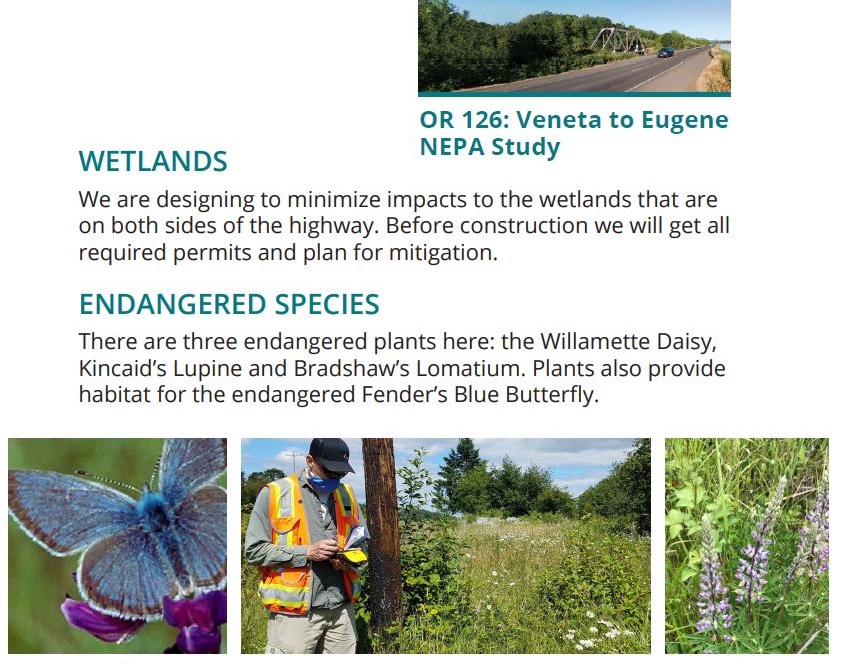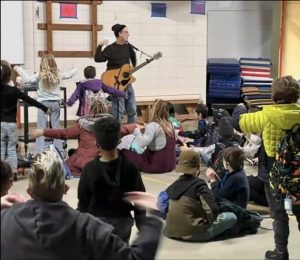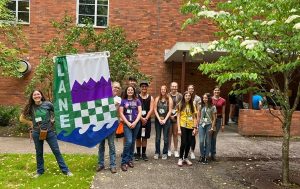Rob Zako: ODOT will use ‘categorical exclusion’ for Highway 126 expansion
4 min read
ODOT will reportedly seek to avoid any further environmental studies for Highway 126 expansion.
The Oregon Department of Transportation wants to expand the road heading west out of town without spending any more time studying its impacts. This news from a featured speaker at the 350 Eugene meeting Feb. 15, Rob Zako.
[00:00:14] Rob Zako: I’m Rob Zako, Executive Director of Better Eugene Springfield Transportation. I’m not an expert but I want to talk tonight about NEPA, about the National Environmental Policy Act of 1969.
[00:00:25] And what I know is, that if you’re going to invest a bunch of federal money, you have to assess what impacts will result from that. And if you know there are going to be impacts, you do what’s called an Environmental Impact Statement— an EIS.
[00:00:38] If maybe there are impacts, you’re not sure, you do an Environmental Assessment, which is a sort of baby kind of Environmental Impact Statement.
[00:00:46] And you either get a FONSI, a Finding Of No Significant Impacts, and then you’re done, or you find that there are impacts and you go to an Environmental Impact Statement.
[00:00:54] In cases where you’re doing something really small, then it’s like, ‘Why go through the trouble? There are no impacts,’ you can do what’s called a Categorical Exclusion.
[00:01:02] And those are the three actions under NEPA: Environmental Impact Statement, Environmental Assessment, and a Categorical Exclusion—for yes impacts, maybe impacts, or definitely not impacts.
[00:01:12] So. Why do I mention all this? I mention this because 350 Eugene and BEST, and some other organizations, 1000 Friends of Oregon, have been looking at a project that ODOT, the Oregon Department of Transportation, has been planning for quite a while.
[00:01:25] It’s Highway 126 between Veneta and Eugene. Typical for Oregon, have an undivided two-lane highway outside of big cities. And I want to say upfront that there’s really a problem here. People travel on this roadway. Sometimes they crash into each other. Sometimes people die and that’s a bad thing. We don’t want anybody to die. We’d like to find a solution to that.
[00:01:45] That said, after a decade or so studying, ODOT is coming forward with a plan and they’re proposing to take the existing two-lane highway and expand that to be eight lanes of pavement. Now that’s four travel lanes, two in each direction; the center turn lane; two wide shoulders and a separated multi-use path for people walking and biking. But eight lanes of pavement. We haven’t looked at this in detail, but it’s a lot of, it’s a lot of pavement.
[00:02:15] There are wetlands there. We know there are endangered species from the West Eugene Parkway work we did. It’s basically the same area. Fender’s blue butterfly, Kincaid’s lupine. There are four species. Widen a highway, you would expect to generate more traffic because there’s more capacity, which is more driving, which is more greenhouse gas emissions. There’s a lot of money. The project is $250 to $350 million which is money that can be spent on old people walking or biking or riding the bus. So there are opportunity costs. And I’m probably missing some things.
[00:02:44] I’m not saying that those are definitely impacts, but I’m suggesting that, you know, it seems plausible that there are impacts we should study.
[00:02:52] So obviously here, we all agree that ODOT would be doing an Environmental Impact Statement, right, to figure out the impacts? No. What ODOT is doing is a Categorical Exclusion. They’re saying that this is such a small minor project that they can just assert there are no impacts and be done with it. They don’t have to release a study to the public and get comments.
[00:03:14] They’re looking in the next few months to wrap up their study and submit to the Federal Highway Administration and just say, ‘We’re done, there are no impacts, we want to build the highway.’ Which is just inconceivable, just astounding. I mean, they identify four endangered or threatened species and list them, and yet they assert a Categorical Exclusion. It’s really inconceivable.
[00:03:36] So when 350 Eugene, and BEST, 1000 friends of Oregon, and some other allies learned this a few weeks ago, we were pretty concerned.
[00:03:43] And we got together, we wrote a letter to ODOT citing chapter and verse of the Federal Highway Administration’s regulations. And it doesn’t look to us like ODOT is doing what the law says they should be doing. So we’re just asking to explain that. We’re moving deliberately to at least get the information to assess the impacts of this and decide what next steps are.
[00:04:05] John Q: Asking questions of Rob Zako, members of 350 Eugene.
[00:04:09] 350 Eugene Member: Everything I’ve been reading in the last year from all over the United States, including big in Portland, is road reduction and what that does to the communities and to people and to our lives. So this is just totally in the wrong direction.
[00:04:26] Rob Zako: Yep.
[00:04:26] 350 Eugene Member: If we’re going to be serious about global warming, we need to have the conversation about public transportation and diminishing private transportation. Is that part of the conversation at all?
[00:04:43] Rob Zako: Not for ODOT, but when we get engaged, yes.
[00:04:46] John Q: Rob Zako speaking about plans to expand Highway 126.
[00:04:51] For more about 350 Eugene’s current activities, see https://www.350eugene.org.



